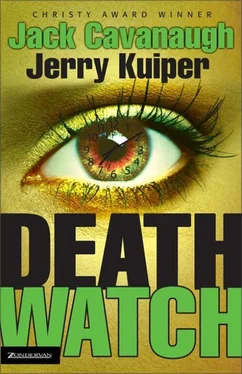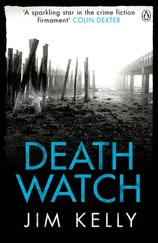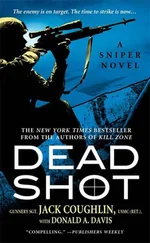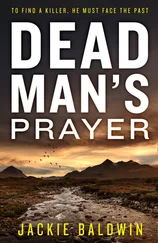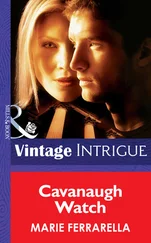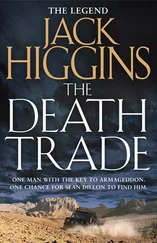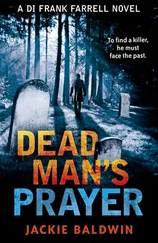Hunz shook his head. “There is no production lab. No master plan.”
“What about someone else? If the technology is possible, maybe someone else—”
“The theory was based on Baranov’s money and Kiselev’s brains. And from what the FBI told me, Baranov is as anxious as we are to find out who’s behind Death Watch. His mother died this morning. A death watch victim.”
Sydney touched his arm with sympathy. “That was our best lead. It all made sense, in a warped, villainous way. So what are we left with? Does the FBI or your EuroNet team have any other suspects? ”
“A hundred leads. All long shots.”
Sydney looked toward the back of the plane. “That means that Cheryl and Josh will most likely ”
“Yeah.”
“At least you’ll get your exclusive,” Sydney said, her tone turning hard. Just because she was disappointed his theory hadn’t worked out didn’t mean she’d forgiven him for exploiting Cheryl.
“Yeah. Looks like I will,” Hunz said sadly. “But that’s not why I arranged to get Cheryl back to Chicago.”
“But you just said . ”
“I said there is always a price to pay.”
“An exclusive.”
Hunz nodded. “An exclusive.”
“You have something up your sleeve,” Sydney said.
Hunz laughed. “I wish I did.” He sighed heavily. It was the third sigh since he sat down. “Actually, this whole enterprise is because of you.”
“Me?”
“Last night. The look in Lyle Vandeveer’s eyes. It meant everything to him that you were there. I’d be willing to bet he hadn’t smiled that much in years. Then tonight, after hearing from the FBI…well, I wanted to do something similar for Cheryl, something that would make her smile, make her happy, before…”
“Before she dies.” Sydney finished his sentence for him.
“No,” Hunz said. “Before I die.”
Of the 51,327 tons of cargo that passed through Chicago’s O’Hare airport that month, 167 pounds of it was Billy Peppers.
His feet and hands were frozen, his joints stiff, and his rear end numb from four hours of nonstop vibration. Shut up in the packing crate, in pitch-black darkness, he listened for activity, sounds similar to those he’d heard in LA when they were loading the plane—forklift engines; heavy boots; male voices shouting orders, cursing, talking sports, telling off-color stories. For the last ten minutes or so—who could tell for sure? It was too dark to see his pink Tinkerbell watch—he’d heard nothing except the sound of his teeth chattering.
The vertebrae-wrenching landing would have sent him to the chiropractor tomorrow if he had money for that sort of thing. That was followed by the monotonous rumble of taxiing. With no windows to gauge the distance, it seemed as though they taxied to Cleveland before the engines finally wound down, sounding very much like a huge vacuum cleaner that just had its plug pulled. Soon afterward, Billy felt the fuselage shake as a door was opened. There was activity for a while, then silence.
Buster told him to wait until the workers moved him into the hangar. It was safest that way.
“They’ll offload you,” Buster had said, “stick you off to the side, and pretty much leave you alone. You’re not a priority package, so no one will get to you until morning. That should give you plenty of time to hammer your way out.”
Billy didn’t take the “you’re not a priority package” comment personally.
He strained to hear something beyond the plywood walls. He heard nothing. Buster told him to wait, and Buster knew what he was talking about. But Buster was talking about the way things were supposed to work. Things don’t always work the way they’re supposed to work.
In the dark this needling doubt pricked Billy repeatedly. What if someone had made a mistake? The guys who load and unload cargo weren’t exactly Rhodes scholars. No offense, Buster. It was possible they overlooked him, or were intentionally blinded to the markings on the crate. That wasn’t out of the realm of possibility, knowing what he knew.
Billy leaned forward at the thought. There were two sides to this spiritual war in which he was involved, with angels on both sides. It stood to reason that if a good angel told him to go to Chicago, there was a bad angel who didn’t want him here, and it was certainly within a bad angel’s ability to blind the eyes of a cargo handler! If that was the case .
He listened for a new sound—the closing of a cargo hatch. What if they were done unloading? What if Chicago was not the plane’s final destination? He could end up in Boston, or New Orleans, or Winnemucca.
Setting the Nike shoe box to one side—with the lid unsecured, he’d held it the entire trip to keep the angels from spilling out—Billy felt for the hammer Buster had given him. Grabbing it, he let loose with two good whacks across the upper edge of the crate, then listened, which was harder now because of the ringing in his ears from hammering in such close quarters.
The noise didn’t seem to attract attention, but neither did it make much of an impression on the crate. He had little room in which to swing the hammer, and Buster had nailed him in good.
A couple more whacks, harder and louder this time, and he failed to see even a suggestion of an opening along the top edge of the crate. Each blow sounded like firecrackers going off.
It was time for a different approach. Dropping the hammer, Billy pressed his back against the crate and gave the opposite side a couple of kicks with the heel of his shoe.
He saw a strip of light.
A couple more kicks and one entire edge was loose. A couple more and the opening was large enough for him to crawl out.
Tucking his shoe box under his arm, Billy Peppers crouched like a running back prepared to take on a pair of three-hundred-and-fifty-pound tackles. Who knew what he would encounter? But the only thing that hit him when he emerged was the cool Chicago night air.
A quick glance up and down the fuselage revealed he was alone. A huge portal opened up to the airport runway. In the distance, an Aer Lingus Airbus with a green shamrock spotlighted on its tail was landing.
Billy approached the edge of the hatch. He saw no ramp, no ladder. He’d have to jump. It was about an eight-foot drop, maybe ten. Most days this would be a challenge. Tonight, with his feet frozen and his knees feeling like rusted hinges, the jump had pain written all over it.
He heard voices, though he couldn’t see the men they were attached to. They were getting louder. Billy looked at the tarmac. Jump or hide? Did he have a choice? The crate was yawning open. He supposed he could nail it shut again, but what then? Hide among the cargo? He could possibly get lucky and someone would pull a ramp up to the side of the plane and then leave again so he could walk out. Or they could shut him up in the belly of this silver whale, and the next thing you know he’d be disgorged onto the sands of Winnemucca.
It was time to take a leap of faith.
Billy crouched down, prayed a simple h elp-me-Jesus prayer, and jumped.
There was a moment when he seemed to hang suspended in the air, an exhilarating feeling of flight that ended suddenly and most painfully. The tarmac struck the bottom of his feet with what felt like lightning; his knees cracked and buckled; the Nike shoe box went flying, spilling angels everywhere; and when the rest of him crashed against the cement, he tried to stop himself from falling with outstretched hands and managed to scrape both palms, embedding pebbles in his flesh that looked like little comets with long red tails.
With his cheek pressed against the cement, while various body parts issued emergency signals to his brain, Billy remembered how parachute jumpers dipped their shoulders and rolled upon impact. Sure, now he remembered.
Читать дальше
